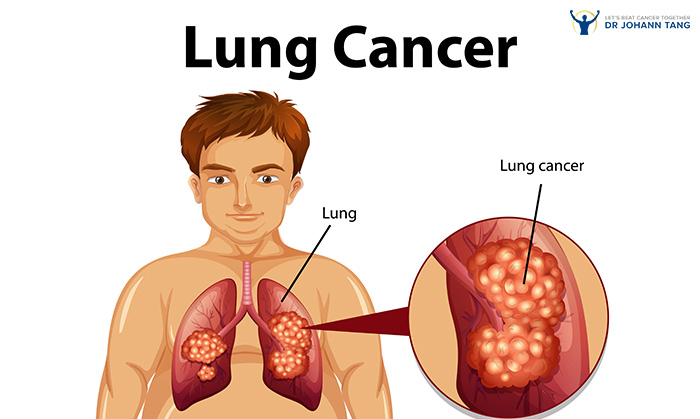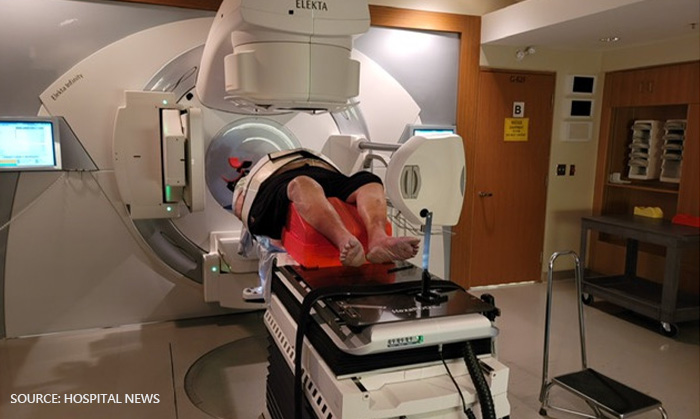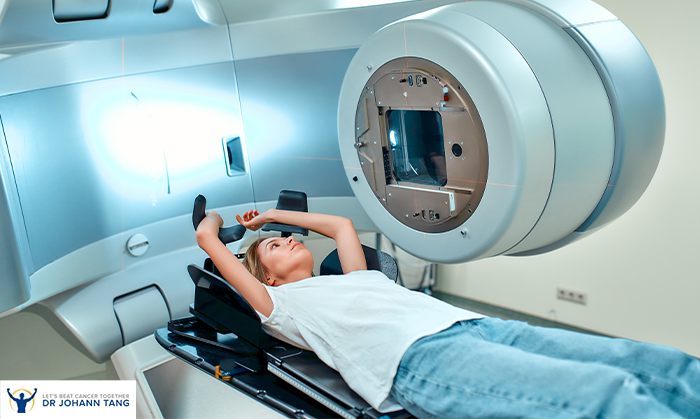The Onset Of Lung Cancer And Available Treatment Methods
Medically reviewed by Dr Johann Tang, Senior Consultant Radiation Oncologist

Did you know that lung cancer is the leading cause of cancer deaths in Singapore men at 26.4%? Lung cancer occurs when the cells in the lungs divide uncontrollably, spreading to surrounding tissues. While it starts in the lungs, it can spread to other areas including lymph nodes or the brain. There are two types of lung cancer – small cell lung cancer (SCLC) and non-small cell lung cancer (NSCLC). SCLC is typically caused by cigarette smoking while NSCLC, the more common type of lung cancer, is where the cells grow out of control, thus developing tumours, lesions or nodules. In this article, we explore more about the symptoms, risk factors and available treatment including lung cancer radiation treatment.
Causes and Risk Factors
There are several causes and risk factors of lung cancer. Though some can be managed and prevented, others may not. Controlled risk factors include lifestyle habits such as smoking and exposure to secondhand smoke. When it comes to smoking, cigarette smoke contains carcinogens, which is a cancer causing substance that can damage the cells that line the lungs. As our bodies are naturally self-healing, this damage may be repaired. However, with constant exposure, the rate of harm supersedes the rate of recovery. When this continues to occur, the damaged cells can become more erratic, leading to lung cancer. For non-smokers, it is also advisable to reduce exposure to secondhand smoke. Though it may not be as dangerous as smoking, prolonged exposure can still result in carcinogens attacking the lungs, albeit at a slower place.
On the other hand, uncontrolled causes include a family history of lung cancer. An individual’s risk of lung cancer increases when they have a parent, sibling, or child suffering from the disease. In such cases, it is highly recommended to go for regular health check-ups to detect lung cancer in its early stages and receive the relevant treatment like surgery or SBRT radiotherapy.
Symptoms

Unfortunately, lung cancer symptoms only appear during late onset of lung cancer. There are typically little to no signs when the cancer first starts. Hence, should you experience any of these symptoms e.g. coughing up blood, shortness of breath, chest pain and constant coughing, it is best to visit a doctor and get a proper diagnosis of your condition. Most of these symptoms revolve around respiratory issues as the lungs are responsible for carrying oxygen to our bodies and expelling carbon dioxide. Therefore, when lung cancer impedes regular function of the lungs, such respiratory symptoms may begin to appear. Should you experience any of these signs it is advisable to visit your doctor and they may recommend lung cancer radiation treatment if lung cancer is diagnosed.
Treatment
With regards to lung cancer treatment options, it all depends on your condition and what your doctor recommends. Treatment can include chemotherapy, radiotherapy, surgery and more. In chemotherapy, cancer cells are killed with drugs. Your doctor may also combine chemotherapy with radiotherapy for more effective treatment.
New advanced radiation treatment for lung cancer treatment includes stereotactic body radiotherapy (SBRT) which is a short but effective high dose radiation treatment used for early stage lung cancer. In normal lung cancer radiation treatment, the doctor uses high-powered energy beams to kill cancer cells. A machine directs radiation to the cancer cell areas, with the patient lying on a table. On the other hand, SBRT radiotherapy involves 3 to 5 sessions of radiation treatment, using multiple radiation beams to deliver high doses of radiation treatment to target the cancer. This treatment can be completed in one or a few sessions and can treat lung cancer and sites which the cancer has spread such as the bone or liver. Clinical results have shown that by having SBRT treatment, the ability to control the disease is higher than normal standard radiation treatment.

Alternatively,surgery may be recommended to remove the cancer. Surgery is suitable for patients whose lung cancer is confined to the lungs. There are different types of lung surgery procedures, from wedge resection that removes a small section of the lungs with the cancer to pneumonectomy, which involves removing the whole lung. In certain cases, lung cancer radiation treatment may be required first to shrink the cancer so that surgery can be performed.
Ultimately, it is ideal to consult your doctor about your condition before making any major decisions. Healthcare providers will be able to recommend a solution tailored to your needs and preferences.
Interested in looking at SBRT radiotherapy or lung cancer radiation treatment options, Dr Johann Tang is a radiation oncologist, providing radiotherapy solutions in Singapore. Contact us today for more information.
Related Articles
Read this next ...

Dr Johann Tang
Senior Consultant Radiation Oncologist
Medical Director of ME Novena Specialist Group Pte Ltd
MBBS (Aust), FRANZCR (Radiation Oncology)
Dr Johann Tang is the Senior Consultant and Medical Director of ME Novena Specialist Group Pte Ltd. at Mount Elizabeth Novena Hospital and an Assistant Professor at the Yong Loo Lin School of Medicine, National University Singapore. Dr Tang’s journey towards being a radiation oncologist in Singapore started with him obtaining his medical degree from the University of Newcastle, Australia, in 1998 and completing his house officer training at the Hunter Area Health Service before returning to Singapore to complete his National Service in the Singapore Armed Forces Medical Corps. Thereafter, he did his specialty training in Radiation Oncology in Singapore at the National University Hospital (NUH). After obtaining his fellowship from the Royal Australian College of Radiologists (FRANZCR) in 2007, Dr Tang underwent breast brachytherapy fellowships at the University of Wisconsin as well as prostate brachytherapy, skin, and paediatric fellowships at the Peter Maccallum Cancer Institute, Australia. In 2021, Dr Tang underwent a fellowship at the New York Proton Centre with Dr Charles Simone in head and neck, re-irradiation, paediatric, prostate, and lung cancers.
Why Choose Dr Johann Tang
Dr Johann Tang is an experienced radiation oncologist and cancer doctor who aims to deliver the highest level of care to his patients, especially when it comes to radiation therapy and cancer treatment. As a cancer specialist in Singapore, he is dedicated to understanding each patient’s condition and providing holistic, customised care that is both effective and compassionate. With ethics and empathy at the core of our practice, we strive to understand your individual needs and provide care that is compassionate and responsive.
"I guarantee my very best expertise delivered with compassion and dignity as we journey TOGETHER to BEAT this dreaded illness."
Make An Enquiry
Got Queries? Book an appointment with Dr Johann Tang by filling up this form. We'll get on a call with you as soon as possible.
Prefer to talk? Call us directly at +65 6690 6811
or email us at drjohanntang@gmail.com





